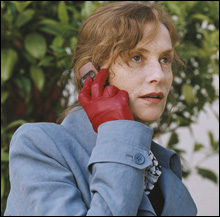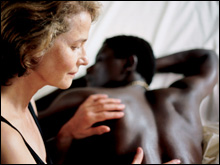
TOWERING PERFORMANCES: Isabelle Huppert in L'invresse du pouvoir, Charlotte Rampling in Ver le sud.
 |
Moviegoers seeking release from the increasingly unavoidable escapism of superhero movies will find much to enjoy in the 11th Boston French Film Festival, which runs at the Museum of Fine Arts through July 23. At least half the films being presented this year are excellent, thought-provoking, satisfying works of non-computer-generated cinema. And the rest aren’t too shabby either.If today’s French cinema can’t, or won’t, compete with Hollywood in the intensity of its special effects, it more than compensates with the intensity of its emotions and ideas. Take Robin Campillo’s LES REVENANTS|THEY CAME BACK (2004; July 8, 7:15 pm + July 14, 6 pm). Here’s a zombie movie with no violence or gore that still bests the recent crop of revisionist fast-moving zombie flicks. Thousands of the recently buried come back to life and resume their lives in a suburban town, where they become more a social problem than a police and SWAT-team matter. By turns an examination of aging, immigration, and the downsized workplace, Les revenants in the end becomes a meditation on death and letting go. It builds tension like the horror movies Val Lewton produced in the 1940s.
LE COUPERET|THE AX (2005; July 9, 5:15 pm + July 20, 4 pm) is unexpected too. A savage comedy by Costa-Gavras, the director of Z, it also deals in downsizing. Here a chemical engineer, let go two years before the film begins, decides his only recourse in today’s competitive job market is to murder everyone else who’s qualified for his position. José García is by turns harried and cool as the job-seeking murderer, a combination of Bob Hoskins and Jack Lemmon in the kind of desperate middle-class, end-of-his-rope comedy Lemmon specialized in. Costa-Gavras, after years of political thrillers, has perhaps found a true calling in social comedy.

In Arnaud and Jean-Marie Larrieu’s PEINDRE OU FAIRE L’AMOUR|TO PAINT OR MAKE LOVE (2005; July 15, 2:15 pm + July 23, 5 pm), Daniel Auteuil plays a successful meteorologist whose wife (Sabine Azéma) convinces him to buy a country house after he takes early retirement. What to do with your life after the system is through with you is a preoccupation of the films in this festival; Peindre ou faire l’amour is about two French baby-boomers who connect with nature and the elements after they’ve put work and children behind them. Their reconnection in part takes the form of spouse swapping with a younger, blind village mayor and his hot wife. In the ’70s, this would’ve been a gauzy softcore romp; here it’s something more mainstream, yet weirder: a non-cliché’d spiritual journey through a walnut grove.
Treacherous walks through dark forests connect Peindre ou faire l’amour with Fabrice du Welz’s CALVAIRE|THE ORDEAL (2004; July 20, 8:15 pm), essential viewing for anyone beguiled by cinema at its most extreme. This crazy, horrible shocker follows a cheesy singer (Laurent Lucas) into the countryside, where his van breaks down and he’s held captive by a disgusting ex-comedian-turned-innkeeper. When the Straw Dogs–like villagers become jealous of the innkeeper’s new guest, things get much worse. Few will be able to take this jaw dropper, which features a nightmarish group dance scene that out-zombies Les revenants.
LA TRAHISON|THE BETRAYAL (2005; July 15, 4:15 pm + July 22, 5:15 pm), by Philippe Faucon, and L’ÉQUIPIER|THE LIGHT (2004; July 9, 3 pm + July 23, 1 pm), by Philippe Lioret, are subtle, slow-building films set during and right after the Algerian war. La trahison rejects battle scenes in favor of an interior drama of conflicting loyalty and deception among French platoon officers and harkis, Algerian soldiers enlisted as translators. The film is an elliptical and quiet investigation with obvious parallels to the war in Iraq. In L’équipier, an Algerian war vet (Grégori Derangère) takes a job as a lighthouse keeper in Brittany. Taciturn and handsome, perhaps a shade too Costner-ish, Derangère is convincing as a man disfigured and haunted by the torture he participated in as a soldier in Algeria. But the film belongs to Philippe Torreton and Sandrine Bonnaire as a husband and wife who along with the rest of their village reject him as an outsider. L’équipier echoes Hitchcock, D.W. Griffith, even the James Cameron of Titanic.
Can plasticized Kieslowski be as good as the real thing? L’ENFER|HELL (2005; July 15, 12:15 pm + July 23, 3 pm), directed by Danis Tanovic from a script by Krzysztof Piesiewicz and Kieslowski and conceived as part of a trilogy based on Dante’s Comedia, proves that it can. Tanovic makes L’enfer a tribute to the Trois couleurs director’s style. Emmanuelle Béart, Karin Viard, and Marie Gillain play three sisters with men problems whose paralyzed, mute mother (Carole Bouquet) exerts a destructive influence on their lives. All four actresses give brittle, smoldering performances. The film is tricky and deep-dish, self-consciously Greek in its tragedy.